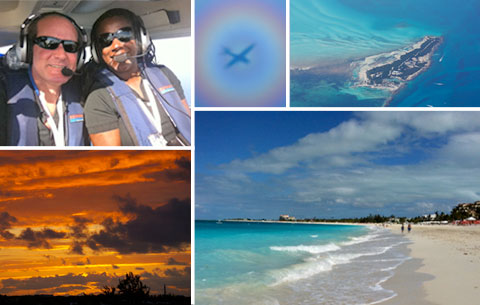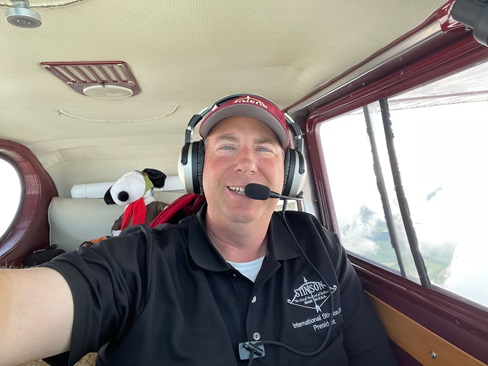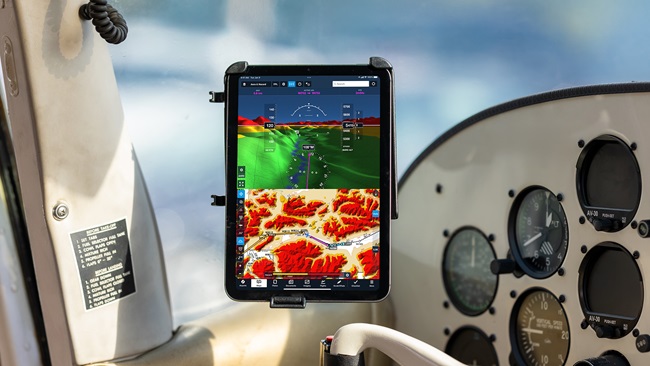
A Boeing 747 captain who was stricken in his prime with a career-ending illness, and restored to health by a liver transplant, has launched on a 16,000-mile mission of hope and learning in a general aviation airplane.
Chris McLaughlin, 47, and his wife Corrine, 46, an airline purser, are flying from Cape Cod in Massachusetts to Cape Horn, at the southern tip of South America, and back to celebrate life and raise awareness about the life-saving efforts of organ donors and the medical teams that enable their bequests to save lives.
 The McLaughlins aren’t adhering to a strict timetable as they fly south with a GPS in their laps, piloting a “relatively stock” single-engine Cessna Hawk XP, with Corrine, a private pilot, in the left seat, and flight instructor Chris holding down the starboard side. The plan was to make the flight visually at low altitude as much as possible, with a thoroughly uncomplicated plan for dealing with adverse weather.
The McLaughlins aren’t adhering to a strict timetable as they fly south with a GPS in their laps, piloting a “relatively stock” single-engine Cessna Hawk XP, with Corrine, a private pilot, in the left seat, and flight instructor Chris holding down the starboard side. The plan was to make the flight visually at low altitude as much as possible, with a thoroughly uncomplicated plan for dealing with adverse weather.
“If it looks crummy, then let’s just go back to the pool,” he said.
The pair left the states behind in early January, departing Naples, Fla., on Jan. 5 bound for the Bahamas. By mid-January they had made their way down through the Caribbean, tackled some challenging weather near the Dominican Republic, wrestled with paperwork in a few places, but also made new friends and done some local sightseeing—all faithfully reported in a trip blog.
Just as they were leaving Florida, Chris and Corrine were bolstered by the “awesome news” that the government of Argentina would permit them to fly out to the Falkland Islands—a development that would help shape the route and timing for the end of their southward trek.
 “From there, we'll head down to Ushuaia on Tierra Del Fuego,” they informed followers by email. “The return flight back from Stanley (capital of the Falklands) will be an issue if there are strong westerly winds, and we'll need to keep an eye on that.”
“From there, we'll head down to Ushuaia on Tierra Del Fuego,” they informed followers by email. “The return flight back from Stanley (capital of the Falklands) will be an issue if there are strong westerly winds, and we'll need to keep an eye on that.”
Another email on Jan. 18 announced that that they had “found Brazil and we're off to Fortaleza today from Sao Luis.”
The timetable was still pretty easy to manage. “Our main limitation is the Jan 28th permit from Rio Gallegos (Argentina) to Port Stanley in the Falklands,” they wrote.
At each stop, Chris and Corrine are sharing a larger-than-life story of personal tragedy followed by survival made possible by Chris receiving a liver transplant at a London hospital, followed by months of recovery, and a new approach to life. But it was a close call.
In 2010, McLaughlin was pursuing a career as a Boeing 747 captain for British Airways when he suffered sudden liver and kidney failure that was attributed to a previously undetected childhood exposure to hepatitis.
 “After many months in intensive care at King’s College Hospital in London, Chris was miraculously given a liver transplant at what could only be described as the last minute and most certainly would not be here today if it were not for the incredible team of people at King's College Hospital, one of the top organ transplant facilities in the world giving the gift of life to hundreds of people a year, and leading the way in research,” says their website Flight4lives that recounts the story, records their travels, and promotes support for King’s College Hospital Charity.
“After many months in intensive care at King’s College Hospital in London, Chris was miraculously given a liver transplant at what could only be described as the last minute and most certainly would not be here today if it were not for the incredible team of people at King's College Hospital, one of the top organ transplant facilities in the world giving the gift of life to hundreds of people a year, and leading the way in research,” says their website Flight4lives that recounts the story, records their travels, and promotes support for King’s College Hospital Charity.
Chris says that he is “feeling totally great” now, and possesses a third-class medical certificate, making him one of about 50 pilots flying after receiving liver transplants, he said. But his 18-month absence from his airliner cockpit required early retirement, soon followed by the decision to spread the word about the lifesaving work taking place at Kings.
The McLaughlins are well practiced for their long flight, however, having previously taken two months to fly coast-to-coast across the United States.
The other equally important message Chris and Corrine are striving to convey is focusing a spotlight of encouragement on organ donation for the many people who have pondered making arrangements to be donors, but haven’t yet acted to firm up the commitment. As if further incentive were needed, Chris says, consider this: While some 110,000 patients wait for transplants, about 17 die daily in the United States for lack of a donor.
What makes that statistic even more of a tragedy, as the McLaughlins emphasize on their website, is that each person “can help save up to eight lives and improve 75 others by being an organ donor, but a lot of us have not given enough thought to the issue.”
 “Most people want to help, but don’t get around to it,” Chris said in an AOPA interview during the planning phase of the cape-to-cape journey. “It’s free, it’s good. There’s nothing creepy about it.”
“Most people want to help, but don’t get around to it,” Chris said in an AOPA interview during the planning phase of the cape-to-cape journey. “It’s free, it’s good. There’s nothing creepy about it.”
Chris’s blunt talk about his prospects—“I may last 20 years, I may last two, there’s no way to tell.”—contrasts strikingly with the emerging travelogue the McLaughlins are writing jointly in exuberant voices about the gifts of life and flight that his restored health has provided them.
Corrine had the tough sledding during his illness and months of intensive care at King’s College Hospital, Chris said. But now that probably seems long ago as they render their accounts of the new, much happier adventure, vividly describing breathtaking views (picture Chris snapping photos of scarlet ibis and flamingoes from 2,000 feet over Suriname jungle) from the Cessna as they fly from northern winter into southern summer. (Check out Corrine’s Jan. 15 blog entry on how she demonstrated to onlookers in Georgetown, Guyana, that Chris wasn’t the only pilot aboard the Cessna.)

“It’s going great. This is the best fun ever,” Chris reported on a day that found them “hanging out in my old DC-10 hotel in Grenada.”
The McLaughlins will consider all the planning and effort meaningful if their journey—both medical and aeronautical—motivates people to support organ donation and the institutions that perform the surgery. You couldn’t ask for a more dedicated pair of messengers for the cause.
“I just want to show people, ‘Look what happens,’” he said.



